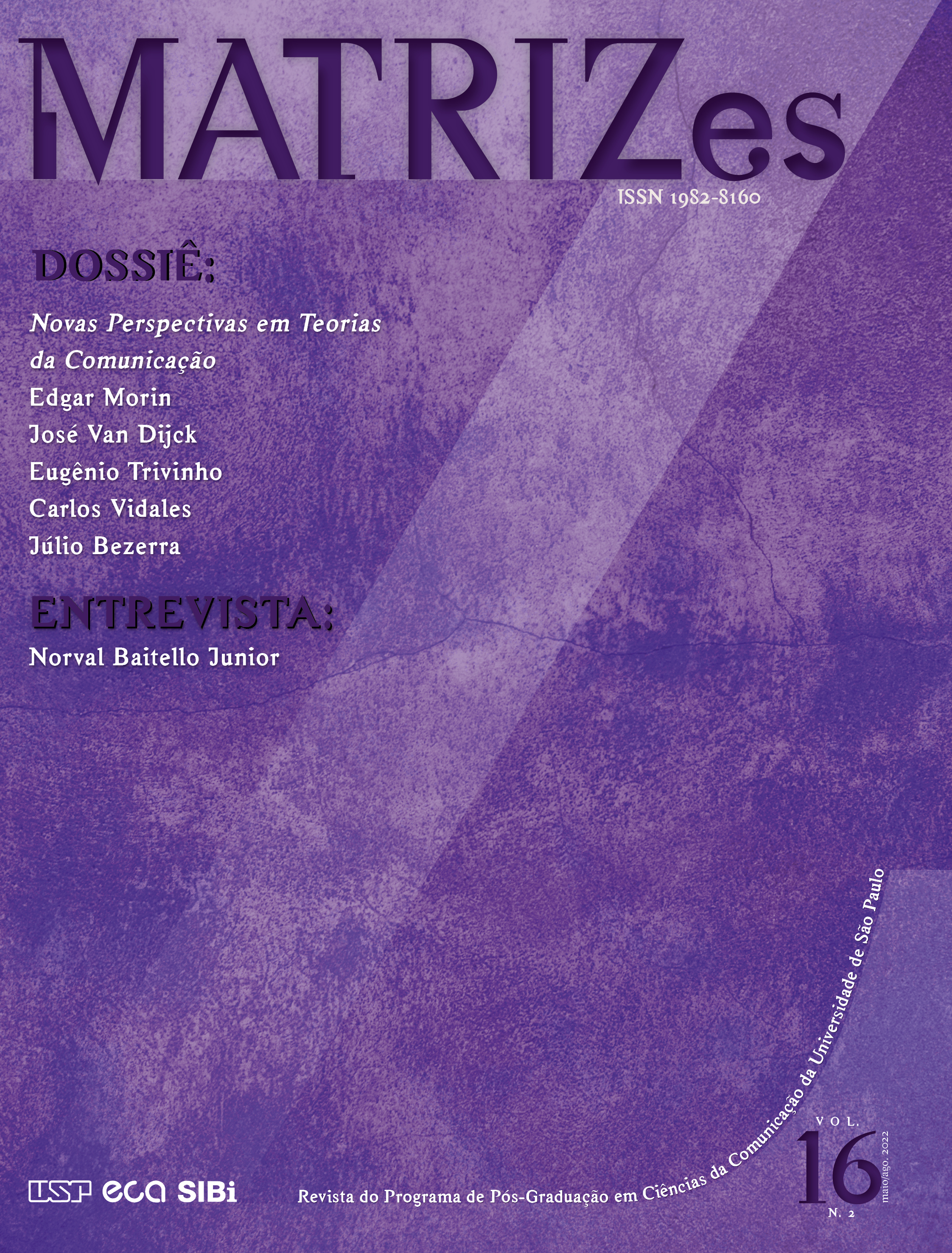The Mediatization of Memory
DOI:
https://doi.org/10.11606/issn.1982-8160.v16i2p137-149Keywords:
Collective memory, Memorialization, Halbwachs, Media, InternetAbstract
In times of intense mediatization, we face the problem of the potential defragmentation of memory in the face of an open and infinite virtual space. Understanding the role of memory in contemporary societies implies contemplating its mediatized expansion, responsible for the profusion and acceleration with which societies produce memorial traces. This paper presents the main schools of thought in memory studies and traces the current political and social implications of memory. Also, it analyzes the role of media on the very notion of memory, namely, the paradox of digital memory, the shortening and pollution of memory caused by digital media, and the Internet as a kind of palimpsestic memory of the present time.
Downloads
References
Assman, J. (1995). Collective memory and cultural identity. New German Critique, (65), 125-133. https://doi.org/10.2307/488538
Babo, I. (2018). Média, tempo e memória. Vista, (2), 77-95. https://doi.org/10.21814/vista.2995
Babo, M. A. (2009). Escrita, memória, arquivo. Revista de Comunicação e Linguagens, (40), 45-51.
Candau, J. (2011). Memória e identidade. Contexto.
Cavallaro, D. (2002). Cyberpunk and cyberculture: Science fiction and the work of William Gibson. The Athlone Press.
Erll, A. (2008a). Cultural memory studies: An introduction. In A. Erll & A. Nünning (Eds.), Cultural memory studies: An international and interdisciplinary handbook (pp. 1-17). De Gruyter. V.16 - No 2 maio/ago. 2022 São Paulo - Brasil SAMUEL MATEUS p. 1-13 13 SAMUEL MATEUS DOSSIÊ
Erll, A. (2008b). Literature, film and the mediality of cultural memory. In A. Erll & A. Nünning, Cultural memory studies: An international and interdisciplinary handbook (pp. 389-398). De Gruyter.
Fisher, M., Goddu, M. K., & Keill, F. C. (2015). Searching for explanations: How the internet inflates estimates of internal knowledge. Journal of Experimenta Psychology, 144(3), 674-687. https://doi.org/10.1037/xge0000070
Giddens, A. (2002). Modernidade e identidade. Zahar.
Halbwachs, M. (1950). La mémoire collective. Presses Universitaires de France.
Halbwachs, M. (2013). A memória coletiva. Centauro.
Hoskins, A. (2009). The mediatisation of memory. In J. G. Hansen, A. Hoskins & A. Reading (Eds.), Save as... Digital memories (pp. 27-43). Palgrave Macmillan.
Landsberg, A. (1995). Prosthetic memory: Total Recall and Blade Runner. In M. Featherstone & R. Burrows (Eds.), Cyberspace/cyberbodies/cyberpunk: Cultures of technological embodiment (pp. 175-189). Sage.
Lemos, A. (2002). Cibercultura. Tecnologia e vida social na cultura contemporânea. Sulina.
Lévy, P. (1999). Cibercultura. Editora 34.
Lévy, P. (2000). A inteligência coletiva: Por uma antropologia do ciberespaço. Loyola.
Misztal, B. (2003). Durkheim on collective memory. Journal of Classical Sociology, 3(2), 123-143. https://doi.org/10.1177/1468795X030032002
Sparrow, B., Liu, J., & Wegner, D. M. (2011). Google effects on memory: Cognitive consequences of having information at our fingertips. Science, 333(6043), 776-778. https://doi.org/10.1126/science.1207745
Stiegler, B. (2009). Anamnese e hipomnese. Revista de Comunicação e Linguagens, (40), 11-26.
Sutter, E. (1998). Pour une écologie de l’information. Documentaliste – Sciences de l’Information, 35(2), 83-86.
Virilio, P. (1996). Velocidade e política. Estação Liberdade.
Wegner, D. M., & Ward, A. F. (2013, 1o de dezembro). The internet has become the external hard drive for our memories. Scientific American. https://bit.ly/3bgTMKh
Downloads
Published
Issue
Section
License
Copyright (c) 2022 Samuel Mateus

This work is licensed under a Creative Commons Attribution-NonCommercial-ShareAlike 4.0 International License.
Authors who publish in this journal agree to the following terms:
- Authors retain the copyright and grant the journal the right to first publication, with the work simultaneously licensed under the Creative Commons Attribution License (CC BY-NC-SA 4.0) which allows sharing of the work with acknowledgment of authorship and initial publication in this journal for non-commercial purposes.
- Authors are authorized to assume additional contracts separately, for non-exclusive distribution of the version of the work published in this journal (eg, publishing in institutional repository or as a book chapter), with acknowledgment of authorship and initial publication in this journal.






















